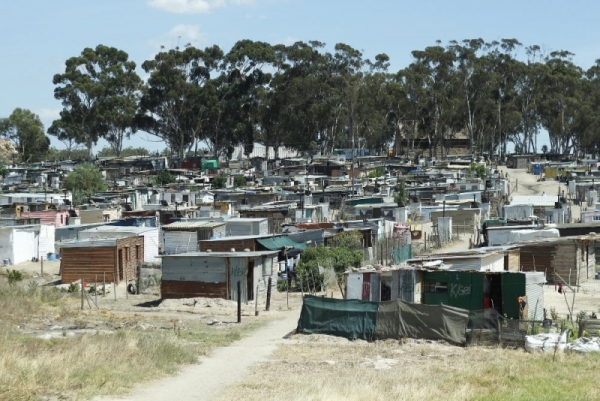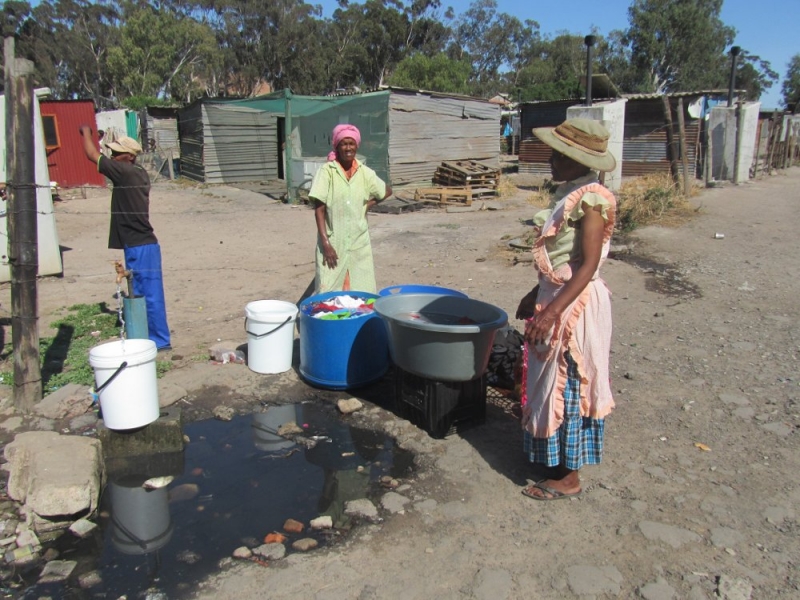

Klipheuwel is an informal settlement to the north-west of Durbanville, Cape Town. Photo by Masixole Feni.
10 December 2015
The City of Cape Town is negotiating with a private owner to buy land in Klipheuwel and install services for families living in the informal settlement.
Mayoral Committee member for Human Settlements Benedicta van Minnen said the City could not install services on private land. So far the owner’s asking price had been “unreasonable”, she said, but negotiations were continuing.
She was responding to questions from GroundUp following a protest last Friday by about 50 Klipheuwel residents who marched on the Western Cape legislature on Friday to demand basic services and development of their area.
The march was organised by the Kingdom Change Agents Movement (KCAM), a religious organisation working in the area, and the Klipheuwel Development Forum.
Klipheuwel lies a bit more than 10km north-west of Durbanville. In August a protest against the City of Cape Town resulted in about 25 people being arrested.
Residents addressed their demands to Cape Town Mayor Patricia de Lille but marched on the provincial legislature because they say the City has not listened to them.
The memo demanded that the City:
The memorandum was received by Sharon Horton, an official from the Department of Human Settlements, but protesters insisted on giving it to an official from Premier Helen Zille’s office. Later Xohle Gophe from the premier’s office received the memo.
“We have been in this area for a long time but there are no schools, no proper toilets and electricity. How do you expect us to live in such conditions? The City should move us to open land next to our place,” said Absolom Ngubo, vice-chairperson of the Klipheuwel Community Development Forum.
“The Premier should intervene. We are tired of the Mayor’s office,” said Nogcinile Kondile, 56, who has lived in the area since 2004.
She said the owner of the land had not done anything to develop the area.
Van Minnen said the City had told the Klipheuwel community about its attempts to buy the land.
She said there were concerns about who the Kingdom Change Agents Movement represented since they did not live in Klipheuwel and were not known by the Klipheuwel Crisis Committee. “We cannot see the proliferation of many organisations claiming to represent the same community but not acting in the interest of the broader community,” she said.
According to Klipheuwel Community Development Forum there are 900 households in the informal settlement.
When GroundUp visited Klipheuwel yesterday, some residents were not aware of the Klipheuwel Crisis Committee’s existence. Others said several committees had claimed to represent them since 2001 but had not been recognised by the community.
Bongani Gtathwane, 27, said :”There has never been a committee and we are not aware of the Crisis Committee referred to by the City of Cape Town. The Committee recognised by the community is the Klipheuwel Community Development Forum.”
Bulelani Nokutshaya, 34, agreed. “We are not aware of this crisis committee. I think the City should come show who are these members.”
Kingdom Change Agents Movement executive director Andile Tomana, said the organisation saw itself as facilitators between the City and the Klipheuwel community.
“We do not represent Klipheuwel leadership,” he said.
 A communal tap. Photo by Masixole Feni.
A communal tap. Photo by Masixole Feni.